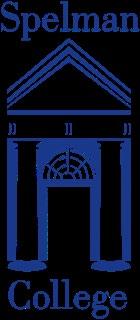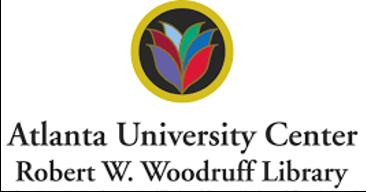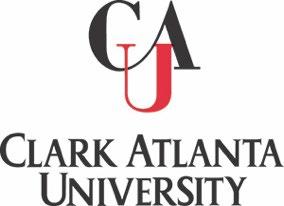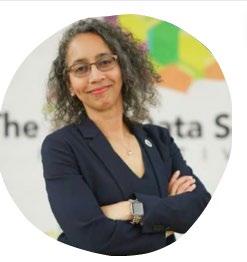AUC Data Science and Analytics Framework



The Atlanta University Center (AUC) Data Science Initiative serves as a hub to catalyze data science education and research across all Historically Black Colleges and Universities (HBCUs), stewarded by the AUC-member institutions, Clark Atlanta University, Morehouse College, Morehouse School of Medicine, and Spelman College, and the AUC Robert W. Woodruff Library. Leveraging the AUC’s rich history in social justice, the Initiative works to develop promising practices that diversify the data science workforce and advance data science on topics that impact Black America.
The AUC Data Science Initiative is supported by the UnitedHealth Group and Mastercard.





The Atlanta University Center (AUC) Data Science Initiative grants educators a nonexclusive license to reproduce and share copies of this publication to advance their work without obtaining further permission from the Initiative, so long as all original credits, including copyright information, are retained.
Any opinions, findings, conclusions, or recommendations expressed in this material are those of the author(s) and do not necessarily reflect the views of AUC Consortium, Inc.
For queries, please contact us at the website https://datascience.aucenter.edu/contact-us
Please cite this work as follows: Atlanta University Center (AUC) Data Science Initiative at the AUC Consortium. (2023). AUC Data Science and Analytics Framework. Atlanta, GA: Author.
There is a growing workforce need for data scientists and other professionals who possess data science skills. From healthcare to retail and advertising to finance, data science and analytics are used by almost all industries and functional areas. The ability to extract actionable insights from data is empowering organizations across all sectors and has catalyzed the need for professionals who possess both a technical ability to manipulate data and the critical thinking skills needed to analyze how these insights can lead to efficiencies and value. To meet the increasing challenges in obtaining, processing, analyzing, and presenting complex data, institutions of higher education are developing new ways to expand the curricula at all levels and across all disciplines.

To steward the development of data science talent, faculty from the Atlanta University Center (AUC) Consortium member institutions, Clark Atlanta University, Morehouse College, and Spelman College, and the AUC Robert W. Woodruff Library developed a framework that stewards each undergraduate institution’s data science and analytics (DSA) minor. In the spring of 2020, the AUC Data Science Minor Pathway Committee began to develop a plan to establish a data science analytics minor at their respective institutions. The Committee included three faculty members, each from Clark Atlanta University, Morehouse College, and Spelman College. The Committee conducted a survey of other DSA minor programs, developed a preliminary draft for the foundation of a DSA minor framework, and mapped out a strategy for implementing a DSA minor at each institution.
Recognizing the need to include those from more disciplines to develop the DSA minor, in the fall of 2020, an expanded team was launched. The 11-member AUC Data Science Minor Team included nine members from Clark Atlanta University, Morehouse College, and Spelman College, and two members from Morehouse School of Medicine and the AUC Library. We worked with the AUC Data Science Minor Team to identify six key learning outcome areas that guide our academic programs, courses, modules, training, and other activities. To prepare students for the workplace of tomorrow, these six key learning outcome areas will equip all learners to meet the increasing data-driven challenges and opportunities.
Sincerely,


We are thankful to those who participated in crafting the Framework.
Clark Atlanta
University Torina Lewis Mathematical Sciences
Morehouse College Kinnis Gosha Computer Science
Spelman College Marionette Holmes Economics
Institution
AUC - Chair Talitha Washington
Clark Atlanta
University Paul Brown Decision Sciences
Clark Atlanta
University Eric Mintz Chemistry
Clark Atlanta
University Sandra Rucker Mathematical Sciences
Morehouse College Derrick Bryan Sociology
Morehouse College Keith Hollingsworth
Business Administration
Morehouse College Alfred Watkins Computer Science
Morehouse School of Medicine Peter Baltrus
Community Health and Preventative Medicine
Institution First Name Last Name Department
Spelman College Yonas Tekle
Spelman College Jerry Volcy
Biology
Computer and Information Sciences
Spelman College Unislawa Williams Political Science
The Atlanta University Center (AUC) Data Science and Analytics Framework identifies six key learning outcome areas that guide academic programs, courses, modules, training, and other activities. To prepare students for the workplace of tomorrow, these six key learning outcome areas will equip all learners to meet the increasing data-driven challenges and opportunities.
1. Mathematics & Statistics
2. Programming
3. Modeling
4. Data Curation
5. Ethics
6. Communication
1. Utilize and apply basic mathematical and statistical theory, including probability, regression, inference, and basic machine learning methods and their applications (Mathematics & Statistics)
● Analyze data to summarize, draw inferences, and make predictions
● Use statistical and mathematical tools to analyze data
● Articulate the rationale and the results of a statistical analysis
2. Demonstrate proficiency in a programming language and general computation for data analysis through projects (Programming)
● Use algorithms and computation to analyze data
● Demonstrate the ability to program in at least one programming language
● Understand how to troubleshoot code (identify errors, search for answers, etc.)
● Utilize statistical software to analyze data and draw conclusions
3. Analyze data in an application area, assess the results, interpret them in context, and explain their limitations, implications, and associated issues (Modeling)
● Apply domain-specific statistical models to analyze data
● Demonstrate ability to build and assess data-based models
● Create visual representations of data that lead to insights and further research
● Formulate questions in a domain that can be answered with data
4. Acquire, clean, prepare, and archive data from varied sources, including text and imagery as well as traditional structures (Data Curation)
● Acquire data from different sources and process, clean, and prepare data
● Describe the process of archiving data
5. Explain ethical, societal, or economic concerns for managing data and applying data science techniques, including the impact of data on those of the African diaspora (Ethics)
● Summarize the underlying social, political, economic, and ethical contexts that are important and inevitably tied to data-driven decision-making
● Describe how these contexts specifically affect the African Diaspora
● Define potential biases that affect the data collection and research process
● Analyze and interpret data using an ethically responsible approach
6. Demonstrate knowledge of and ability to implement a data science project lifecycle and communicate results visually, orally, and in writing to a diverse audience of stakeholders (Communication)
● Visualize, interpret, and explain results cogently, accurately, and persuasively
● Communicate effectively about data, methods, and conclusions
● Demonstrate storytelling with data, including visualization
In developing the six topical areas, the AUC Data Science and Analytics Minor Team leveraged the multi-disciplinary expertise of its members to develop a meaningful framework for all disciplines. The Team mapped and compared the topical areas to Curriculum Guidelines for Undergraduate Programs in Data Science [1] and The National Academy of Sciences report on Data Science for Undergraduates: Opportunities and Options [2].
In the table below, the first column outlines the Curriculum Guidelines for Undergraduate Programs in Data Science; the second column outlines the Opportunities and Options for undergraduates in data science; and the third column outlines the AUC Data Science and Analytics Framework. Note that while some are the framework for the AUC DSA minor. Note that some topics from the first two columns are aggregated and mapped to the Framework in the third column. The Team did decouple ethics and communication as both have great importance in data science education.
Curriculum Guidelines for Undergraduate Programs in Data Science
• Computational and statistical thinking
• Mathematical foundations
• Algorithms and software foundation
• Model building and assessment
• Data curation –preparation and management
• Knowledge transference communication, ethics, and reproducibility
Data Science for Undergraduates: Opportunities and Options
• Statistical foundations
• Mathematical foundations
• Computational foundations
• Data modeling and assessment
• Domain-specific considerations
• Data description and visualization
• Data management and curation
• Communication and teamwork
• Workflow and reproducibility
• Ethical problem solving
AUC DSA Minor Framework
1. Mathematics & Statistics
2. Programming
3. Modeling
4. Data Curation
5. Ethics
6. Communication
1. De Veaux, R., Agarwal, M., Averett, M., Baumer, B., Bray, A., Bressoud, T., Bryant, L., Cheng, L., Francis, A., Gould, R., Kim, A., Kretchmar, R., Lu, Q., Moskol, A., Nolan, D., Pelayo, R., Raleigh, S., Sethi, R., Sondjaja, M., Tiruviluamala, N., Uhlig, P., Washington, T., Wesley, C., White, D., & Ye, P. (2017). Curriculum Guidelines for Undergraduate Programs in Data Science. Annual Review of Statistics and Its Application. 4. https://doi.org/10.1146/annurev-statistics-060116053930
2. National Academies of Sciences and Medicine, Data Science for Undergraduates: Opportunities and Options. Washington, DC: The National Academies Press, 2018. [Online]. Available: https://www.nap.edu/catalog/25104/data-science-for-undergraduatesopportunities-and-options
